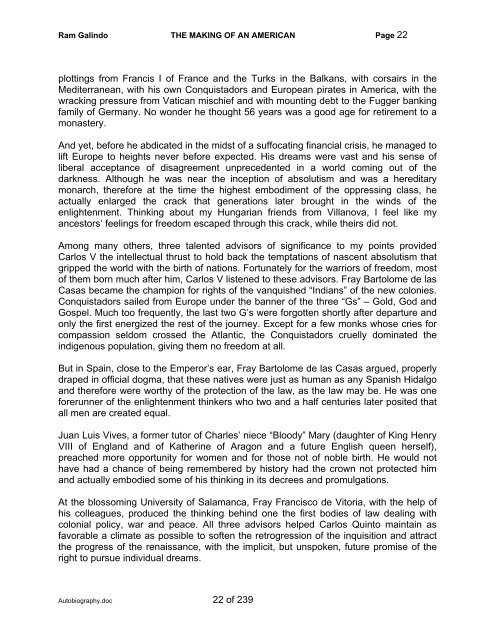Autobiography - The Galindo Group
Autobiography - The Galindo Group
Autobiography - The Galindo Group
You also want an ePaper? Increase the reach of your titles
YUMPU automatically turns print PDFs into web optimized ePapers that Google loves.
Ram <strong>Galindo</strong> THE MAKING OF AN AMERICAN Page 22<br />
plottings from Francis I of France and the Turks in the Balkans, with corsairs in the<br />
Mediterranean, with his own Conquistadors and European pirates in America, with the<br />
wracking pressure from Vatican mischief and with mounting debt to the Fugger banking<br />
family of Germany. No wonder he thought 56 years was a good age for retirement to a<br />
monastery.<br />
And yet, before he abdicated in the midst of a suffocating financial crisis, he managed to<br />
lift Europe to heights never before expected. His dreams were vast and his sense of<br />
liberal acceptance of disagreement unprecedented in a world coming out of the<br />
darkness. Although he was near the inception of absolutism and was a hereditary<br />
monarch, therefore at the time the highest embodiment of the oppressing class, he<br />
actually enlarged the crack that generations later brought in the winds of the<br />
enlightenment. Thinking about my Hungarian friends from Villanova, I feel like my<br />
ancestors’ feelings for freedom escaped through this crack, while theirs did not.<br />
Among many others, three talented advisors of significance to my points provided<br />
Carlos V the intellectual thrust to hold back the temptations of nascent absolutism that<br />
gripped the world with the birth of nations. Fortunately for the warriors of freedom, most<br />
of them born much after him, Carlos V listened to these advisors. Fray Bartolome de las<br />
Casas became the champion for rights of the vanquished “Indians” of the new colonies.<br />
Conquistadors sailed from Europe under the banner of the three “Gs” – Gold, God and<br />
Gospel. Much too frequently, the last two G’s were forgotten shortly after departure and<br />
only the first energized the rest of the journey. Except for a few monks whose cries for<br />
compassion seldom crossed the Atlantic, the Conquistadors cruelly dominated the<br />
indigenous population, giving them no freedom at all.<br />
But in Spain, close to the Emperor’s ear, Fray Bartolome de las Casas argued, properly<br />
draped in official dogma, that these natives were just as human as any Spanish Hidalgo<br />
and therefore were worthy of the protection of the law, as the law may be. He was one<br />
forerunner of the enlightenment thinkers who two and a half centuries later posited that<br />
all men are created equal.<br />
Juan Luis Vives, a former tutor of Charles’ niece “Bloody” Mary (daughter of King Henry<br />
VIII of England and of Katherine of Aragon and a future English queen herself),<br />
preached more opportunity for women and for those not of noble birth. He would not<br />
have had a chance of being remembered by history had the crown not protected him<br />
and actually embodied some of his thinking in its decrees and promulgations.<br />
At the blossoming University of Salamanca, Fray Francisco de Vitoria, with the help of<br />
his colleagues, produced the thinking behind one the first bodies of law dealing with<br />
colonial policy, war and peace. All three advisors helped Carlos Quinto maintain as<br />
favorable a climate as possible to soften the retrogression of the inquisition and attract<br />
the progress of the renaissance, with the implicit, but unspoken, future promise of the<br />
right to pursue individual dreams.<br />
<strong>Autobiography</strong>.doc 22 of 239


